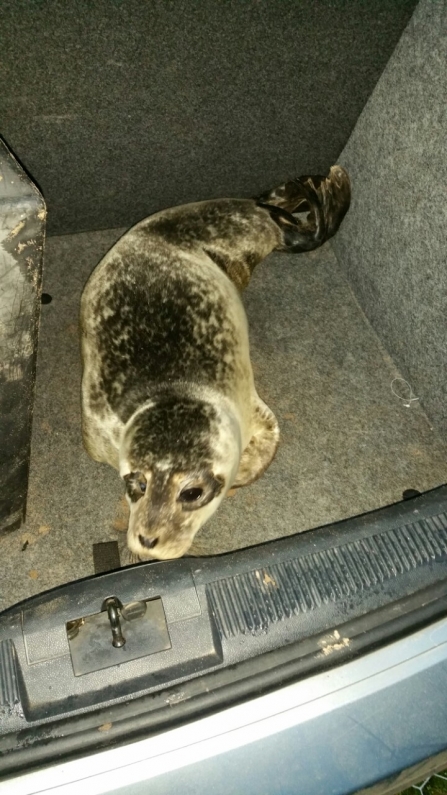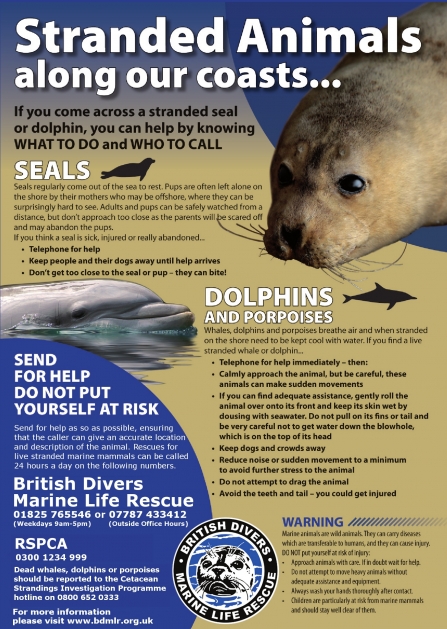Stranded marine animals
Our seas are among the best in Europe for spotting whales, dolphins, porpoises and seals. About 12 species of whale, dolphin and porpoise have been recorded in the Irish Sea. The most commonly seen are harbour porpoises, bottlenose dolphins, common dolphins and minke whales. Leatherback turtles visit the Irish Sea each summer as they pursue swarms of jellyfish, the turtles' staple diet. Seeing one of these ocean giants is a true privilege.
This page will help you know what to do if you find a stranded marine animal and who to report it to.
What to do if you find a live stranded animal
Who to tell
If you find a live stranded whale, dolphin, porpoise, shark or turtle, please contact the relevant authorities:
|
England, Scotland & Wales (all species) |
British Divers Marine Life Rescue RSPCA (England) SSPCA (Scotland) |
01825 765546 (office hours) or 07787 433412 (out of hours) 0300 1234999 0131 3390111 |
| Northern Ireland (whale, dolphin, porpoise or shark) |
DAERA |
028 70823600 (This diverts to a 24 hour mobile if no one is available in the office) |
| Northern Ireland (sick/injured seals) | Exploris Aquarium | 028 427 28062, if no answer, call the NI Water Pollution Hotline on 0800 807 060 |
| Isle of Man (all species) | MSPCA | 01624 851672 |
What to do

Never try to put an animal back in the sea or transport it yourself, even if you think it is sick or injured. This is dangerous for you and the animal. Always contact the relevant organisation before trying to help.
Finding a stranded animal can be distressing. Though your first instinct may be to try to help it back into the water, you should never try to do this - they have stranded for a reason and require urgent professional medical attention.
Keep your distance, and keep other people, dogs, and gulls away. They are wild animals so contact with or proximity to humans can add additional stress to an already distressing situation, and you also put yourself at risk of injury if the animal thrashes or tries to move. Direct contact can also transmit disease.
Contact the relevant organisation as soon as possible using the details above. Note your location, the state of the tide, and any obvious injuries you can see.
Below are some guidelines for commonly reported stranded animals. For specific details on dealing with live strandings, visit the BDMLR website.
Please do not try to deal with a stranded animal alone - always call for help.
Live seals
Are you sure the animal is in distress? Healthy adult seals regularly haul out of the water to rest and seal pups (a seal with a white, long-haired coat in the autumn/winter, or less than 3 feet in length in the summer) are often left alone for short periods of time and may not be able to swim.
The best thing to do is keep watch from a distance.
If the animal is obviously ill, injured, malnourished (visible ribs) or appears to be an abandoned pup, then contact your local strandings team as above for advice and assistance. Once you have called for help, keep a watch from a safe distance and try to keep other people and dogs away.
Don't get too close - seals can give a nasty bite!
Live porpoises, dolphins, whales and sharks
Call for help immediately (contacts above) and your local strandings contact will advise you on what to do next. Never drag the animal or try to return it to sea, and keep dogs and crowds away as best you can and try to limit the stress to the animal, keeping noise and sudden movements to a minimum.
Stay away from the tail - it is very powerful.
Live turtles
Call for help immediately (contacts above). Live turtle strandings are more likely in winter months, when juvenile turtles are swept into our waters by ocean storms. Sea turtles normally live in tropical waters and don't cope well with cold water (anything below 10°C). Their body will stop working properly, leaving them unable to swim, and they end up washing ashore - often badly injured and requiring immediate medical attention. Never try to return the turtle to sea and stay away from their front flippers - they are very powerful.
Leatherback turtles on the other hand are common visitors to the Irish Sea in the Summer and it is quite normal for them to be seen in our waters. They travel to our waters as part of their trans-Atlantic migrations to feed on jellyfish. However, they generally don't come onto land during this time. If you see a leatherback turtle on the beach, or an injured leatherback (i.e. tangled in fishing nets or pots) at sea, please follow the instructions above.
Specific details on dealing with live strandings can be found on the BDMLR website. Please do not try to deal with a stranded animal alone - always call for help.
What to do if you find a dead stranded animal
Who to tell
| England, Scotland & Wales (all species) | Cetacean Strandings Investigation Programme | 0800 652 0333 |
| Scotland (all species) | Scottish Marine Animal Stranding Scheme | 07979 245893 |
| Northern Ireland (cetacean or shark) | DAERA | 028 70823600 |
| Northern Ireland (seal or otter) | DAERA | marine.wildlife@daera-ni.gov.uk |
| Isle of Man (all species) | Manx Wildlife Trust(Marine Officer) | 07624 450879 or 01624 844432 |
What to do
Dead stranded juvenile fin whale
Please report your find. Information collected from dead stranded animals is vital to our understanding of marine life and helps us work to improve marine wildlife protection.
Dead strandings can help us learn about marine animals' diet, health and disease, the effects of pollution and bycatch, distribution, and specific threats that they face.
Avoid touching the animal and always make sure to wash your hands if any contact is made; dead marine animals, like any other animal, can carry disease or infection.
Check out this helpful poster explaining what to do in the event of a seal, porpoise or dolphin stranding.
The poster was created by Jordan Havell, aged 14, leader of Jordan's Stranded Mammals Campaign. After finding a stranded porpoise on his local beach and not knowing what to do, Jordan started his campaign to raise awareness of strandings.
The poster can be downloaded here - please share!
Other animals that have been washed ashore e.g. jellyfish, clams, starfish, octopus
Sometimes other marine animals such as jellyfish, sea urchins, razor clams, crabs, octopus and starfish can be washed ashore sometime is vast numbers. This is often as a result of a climatic event, strong winds or currents or sudden temperature changes.
Information about these mass stranding events and unusual animals washing ashore is vital for helping to improve our understanding of marine life and conservation efforts.

